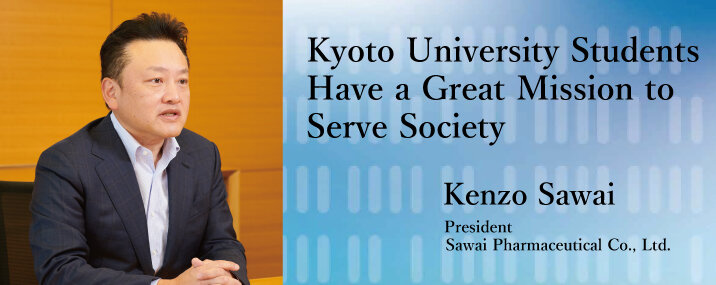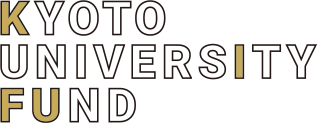Vol.24 Interview with Donors

Kenzo Sawai
Born in Osaka Prefecture in 1968. Graduated from the Faculty of Pharmaceutical Sciences, Kyoto University, in 1993, and completed a master's program at the Graduate School of Pharmaceutical Sciences, Kyoto University, in 1995. Joined Sumitomo Pharmaceuticals (now Sumitomo Dainippon Pharma) in the same year. Joined Sawai Pharmaceutical in 2001. Worked in the Planning Group of the Development Department and at Research and Development Division. Served as Director and General Manager of the Corporate Strategy Department in 2010, Director and Managing Executive Officer and General Manager of the Corporate Strategy Department and Deputy General Manager of the Sales Division in 2013, Director and Senior Managing Executive Officer and General Manager of the Corporate Strategy Department and the Supervisor of Sales Division in 2017. Led the company's U.S. operations, including serving as chairman of the board of Upsher-Smith Laboratories (USL), a U.S. generic manufacturer acquired in May 2017. Served as Senior Managing Executive Officer and General Manager of the Corporate Strategy Department and Supervisor of Research and Development Division, President of SAWAI AMERICA, and Chairman of the Board of USL in June 2018. Assumed current position in 2020.
Q Would you care to share with us your college memories?
I had no intention of succeeding to Sawai Pharmaceutical, which is my family's business, but I did not have a clear goal either. I entered the Faculty of Pharmaceutical Sciences at Kyoto University, simply thinking the faculty seems liberal and interesting. I thought college was the only place where I could study professionally, so I thought no matter what path I took in the future, I should study pharmacy.
In fact, it was up to the individual to decide whether to study or not. I belonged to the tennis and soccer circles, which were affiliated with the Faculty of Pharmaceutical Sciences, worked part-time as a pharmacist at a private hospital, and spent my days playing mahjong with my friends.
However, after I began receiving practical training in my third year, I seriously started attending school. In the pharmaceutics laboratory, we carried out animal experiments and data measurements from noon to late at night, and when we finished, we all went bowling together, ate ramen late at night, and slept until noon the next day. Every day was like that.
I was not planning to go to graduate school and had already found a job at a trading company, but everyone around me was busy preparing for the entrance examination and I had no one to hang out with. So I decided to take the entrance examination myself. I somehow passed the entrance examination and my parents persuaded me to go on to higher education.
The Faculty of Pharmaceutical Sciences had about 80 students per year, and it had a cozy atmosphere with almost all students being familiar with one another, and I was with my laboratory members all the time. I met talented people and still stay in touch with them. No matter which hospital or pharmacy I go to, there will always be someone from Kyoto University who will pay attention to me. I think the most important asset of my time at Kyoto University was the human relationships that I was able to develop. Seeing my seniors who are leading their respective fields motivates me to do my best to catch up with them.
If there is anything I regret, it would be that I wish I had improved my English skills more. When I spent half of a year in the U.S. after acquiring an American company, I really thought I should have studied English harder.
Q After completing graduate school, how did you end up
working at a different pharmaceutical company instead of
your family business?
I could not shake the feeling that I did not want to live someone else's life, so I joined Sumitomo Pharmaceuticals (now Sumitomo Dainippon Pharma), hoping to make it on my own. I was working as a clinical development staff member, but after working for six and a half years, I came to see the future. It takes 10 to 20 years to develop a new drug, and the success rate is low, which means I could only get involved with two to three products at most. At that time, I reconsidered my life.
Sawai Pharmaceutical is the reason I have been able to lead my life without financial hardship, so I thought I should give back to the people who worked there. Generic drugs strongly contribute to society, such as by reducing patients' financial burden, so I thought I could help more people by joining Sawai Pharmaceutical. I thought I should aim to be useful to society, rather than advance my own career. After turning 30, I began to think about my life, including the meaning of my birth, and I eventually decided to join my family business.
Q What kind of efforts do you look forward to seeing Kyoto University
make in this 125th anniversary year and after, and is there a message
you want to leave Kyoto University students with?
Kyoto is a great place to spend your school days. I enjoyed visiting temples and shrines, and thanks to this, I am now able to personally guide overseas visitors when I take them sightseeing in Kyoto. It is important to be able to talk about the history and culture of one's own country, and there is no reason not to take advantage of the environment of Kyoto to learn about Japan. Knowledge and experience will not only be useful for business but will also enrich your life.
Although we are under a lot of restrictions due to the coronavirus pandemic, college years are a precious time when one can spend time just for himself/herself. In addition to studying, I hope that everyone will gain much experience that will enrich their future life.
We all have the desire to be great and to make money. However, once you reach a certain age or status, you start to think about how much you can contribute to society. This feeling becomes stronger the more you interact with society when you are young. Therefore, you should be actively involved in society. For Kyoto University students with excellent brains, the mission of being useful to society must be greater than that of anyone else.
(Interviewed in January 2021)


